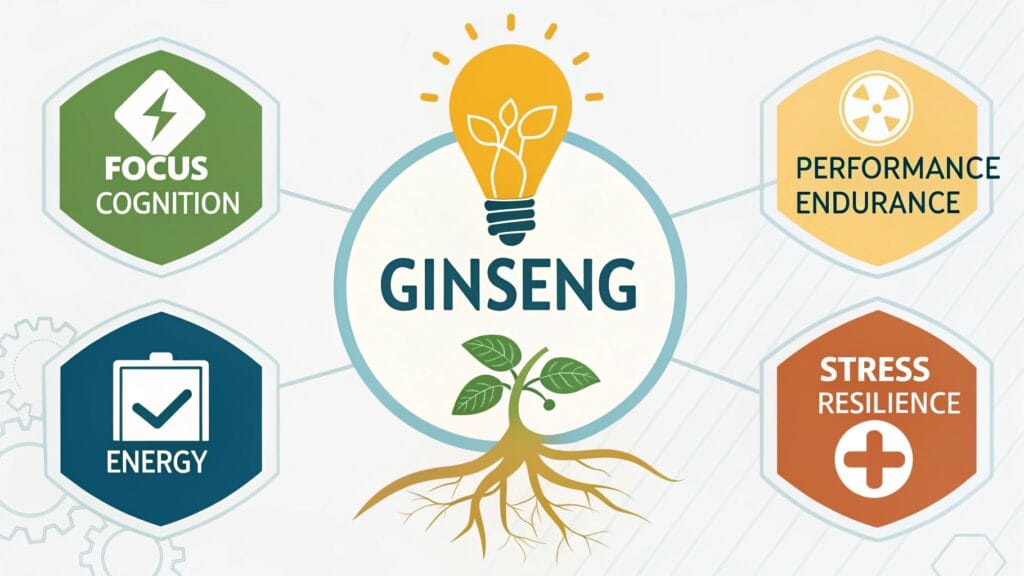Ginseng Benefits for Energy, Focus, and Performance on Your Low-Carb Journey
Are you struggling with energy dips despite following a strict carnivore diet? Do mental fog or stress sometimes get in the way of your performance, even with a well-formulated low-carb approach? You’re not alone. Even with the metabolic advantages of ketosis and animal-based nutrition, sometimes we need an extra edge for optimal functioning.
Enter ginseng – an ancient root revered for thousands of years across Eastern medicine traditions for its remarkable revitalizing properties. This powerful herb belongs to a special class called adaptogens, natural substances that help your body adapt to stress and maintain balance during challenging times.
If you’re minimizing plant foods on a low-carb or carnivore diet, you might wonder if plant-based supplements like ginseng have a place. The answer depends on your specific goals and needs. Let’s explore the research-backed benefits of ginseng for energy, focus, and performance, and see how this ancient root might complement your low-carb lifestyle.
In this comprehensive guide, we’ll cover what ginseng is, its key benefits for low-carb dieters, the different types and forms available, how it might fit into your animal-based approach, and important considerations for choosing a quality supplement.
Table of Contents
What is Ginseng? More Than Just a Root
Ginseng is a slow-growing perennial plant from the Panax genus, valued primarily for its fleshy, fork-shaped root. The name “Panax” comes from the Greek word for “all-healing,” reflecting its traditional reputation as a cure-all. But not everything labeled “ginseng” is true ginseng—authentic varieties come from specific species with distinct properties.
Key Types of Ginseng
Panax Ginseng (Asian/Korean Ginseng): Often considered the most potent variety, Asian ginseng tends to be more stimulating and energizing. It’s traditionally used to enhance vitality, strengthen the immune system, and improve mental performance.
American Ginseng (Panax quinquefolius): Generally regarded as more calming than its Asian counterpart, American ginseng is prized for its cooling properties and potential metabolic benefits. Some research suggests it may have particular benefits for blood sugar management, making it potentially interesting for those transitioning to a low-carb approach.
Siberian Ginseng (Eleuthero): Despite the name, eleuthero isn’t true ginseng but is often grouped with it due to similar adaptogenic effects. It’s known for supporting endurance and resilience during periods of physical or mental stress.
Each type offers slightly different benefits, which we’ll explore as we discuss specific applications for low-carb and carnivore enthusiasts.

Why Energy, Focus, and Resilience Matter on Low-Carb
Before diving deeper into ginseng’s benefits, let’s address why these particular qualities might be valuable for someone following a low-carb or carnivore approach.
Adaptation Support
Many people experience temporary fatigue or what’s commonly called “keto flu” during the initial transition to a low-carb diet. This happens as your metabolism shifts from primarily burning glucose to efficiently utilizing fat and ketones. During this adjustment period, energy levels can fluctuate significantly.
Ginseng’s energy-supporting properties may help smooth this transition by providing targeted support when you need it most. Its adaptogenic qualities might help your body handle the metabolic stress of switching fuel sources.
Performance Optimization
Once adapted to a low-carb diet, many people report improved energy stability and mental clarity. However, if you’re an athlete, knowledge worker, or just someone who wants to perform at their peak, you might be looking for additional support to enhance these baseline benefits.
Many carnivore and keto advocates are drawn to these diets precisely because they seek optimal physical and cognitive performance. Ginseng’s well-documented benefits for energy, endurance, and focus align perfectly with these goals.
Stress Management
Even with the best diet in the world, modern life brings unavoidable stresses. Work demands, family responsibilities, environmental factors, and training stress can all tax your system. Managing stress effectively is crucial for maintaining metabolic health, hormonal balance, and overall wellbeing.
Adaptogens like ginseng are specifically defined by their ability to help the body resist stressors of various kinds. By supporting your stress response system, ginseng may indirectly support your success on a low-carb path by helping you maintain consistency even during challenging times.
Key Benefits of Ginseng
Boosting Energy & Fighting Fatigue
Ginseng’s most famous and well-researched benefit is its ability to combat fatigue and enhance energy levels. This isn’t the jittery, temporary boost you might get from caffeine—it’s more about supporting your body’s natural energy production and improving endurance.
Several clinical studies have demonstrated ginseng’s effectiveness for reducing fatigue. One double-blind, placebo-controlled study found that Panax ginseng significantly reduced mental and physical fatigue in participants with chronic fatigue. The researchers noted improvements in cognitive performance and reductions in oxidative stress markers.
For anyone transitioning to a carnivore diet or experiencing adaptation challenges, this energy-supporting effect could help maintain productivity and wellbeing during the adjustment period.
Enhancing Focus & Cognitive Function
In today’s distraction-filled world, mental clarity and sustained focus are increasingly valuable. One of the frequently reported benefits of low-carb diets is improved cognitive function once fully adapted—but ginseng might offer additional support in this area.
Research indicates that ginseng may enhance various aspects of cognitive function, including:
- Improved memory retention and recall
- Enhanced concentration and attention span
- Faster reaction times
- Better mental arithmetic performance
- Protection against age-related cognitive decline
A systematic review of randomized controlled trials found that Panax ginseng had significant positive effects on aspects of cognition, particularly on “secondary memory” (the ability to consolidate, store, and retrieve information). For knowledge workers, students, or anyone who relies on optimal brain function, these benefits could provide a meaningful edge.
Supporting Stress Response & Resilience
As an adaptogen, ginseng helps normalize physiological functions and strengthen resistance to stress. It appears to work primarily through modulating the hypothalamic-pituitary-adrenal (HPA) axis—the body’s central stress response system.
Studies show that ginsenosides (the active compounds in ginseng) can help:
- Reduce cortisol levels during stressful situations
- Support healthy adrenal function
- Improve recovery from stressful events
- Enhance overall resilience to physical and psychological stressors
This stress-protective effect complements other adaptogenic herbs like ashwagandha, though ginseng tends to be more energizing while ashwagandha is often more calming.
For low-carb dieters facing workout recovery challenges or dealing with life stresses, ginseng’s ability to support healthy stress responses could be particularly valuable.
Supporting Physical Performance
Beyond mental performance, ginseng has shown promise for enhancing physical capabilities as well. Several studies indicate potential benefits for:
- Improved aerobic capacity and oxygen utilization
- Enhanced muscular strength and power output
- Reduced exercise-induced muscle damage
- Improved recovery between training sessions
- Increased endurance during prolonged physical activity
These effects might be especially relevant for those combining a carnivore approach with exercise, as the initial adaptation period sometimes includes temporary performance decrements before the full benefits of fat-adaptation are realized.
Potential Metabolic Support
Particularly interesting for those on a low-carb journey is some research suggesting that American ginseng may help support healthy glucose metabolism. Several small studies have found that American ginseng supplementation may help moderate post-meal blood sugar responses.

While a well-formulated carnivore or keto diet already provides substantial metabolic benefits through carbohydrate restriction, this additional support might be valuable during the adaptation phase or for those who occasionally include some plant foods in their approach.
Ginseng in a Low-Carb / Carnivore Context
Now for the question most relevant to our community: How does ginseng fit into a diet focused primarily or exclusively on animal foods?
A Plant-Based Optional Add-on
First, let’s state the obvious: ginseng is a plant root. For those following a strict carnivore approach for autoimmune or other health reasons, this is an important consideration. Ginseng is not an essential component of a carnivore diet—plenty of people thrive without any supplements whatsoever, focusing instead on nutrient-dense animal foods.
However, many in the low-carb and carnivore communities take a pragmatic approach to certain plant-derived supplements when they offer specific benefits not easily obtained from animal foods alone. Ginseng can be viewed as an optional tool in your wellness toolkit, not a dietary staple.
Filling a Specific Need
Consider ginseng if you’re:
- Experiencing persistent energy or focus issues despite a well-formulated animal-based diet
- Going through a particularly stressful period in work or life
- Looking for additional support during the initial adaptation to a low-carb approach
- An athlete or fitness enthusiast seeking performance optimization
- Dealing with cognitive demands that require peak mental function
The key is identifying a specific need that ginseng might address, rather than adding it indiscriminately. Remember that a properly formulated carnivore diet already provides remarkable benefits for energy, mental clarity, and overall health for many people.
Complementary Benefits
While your core low-carb diet addresses fundamental metabolic health by reducing insulin resistance and inflammation, ginseng works on different but complementary pathways. It primarily supports your stress response system and energy metabolism at the cellular level.
Think of your animal-based diet as building the foundation for optimal health, while targeted supplements like ginseng might help address specific challenges or enhance particular aspects of performance.
Choosing a Ginseng Supplement: Forms and Quality
If you’ve decided to experiment with ginseng, choosing the right form and ensuring quality becomes crucial. The marketplace offers numerous options, each with pros and cons.
Common Forms of Ginseng
Whole Root: The most traditional form, often sliced and dried. Can be chewed directly or used to make tea. Advantage: Minimally processed. Disadvantage: Inconvenient and difficult to standardize dosage.
Powder: Ground dried root that can be added to beverages or taken in capsules. Advantage: Versatile. Disadvantage: Quality varies widely.
Capsules/Tablets: Pre-measured doses in convenient form. Advantage: Precise dosing and convenience. Disadvantage: May contain fillers or additives.
Extracts/Tinctures: Concentrated liquid forms. Advantage: Potentially better absorption. Disadvantage: May contain alcohol as a preservative.
Teas: Dried ginseng brewed as a beverage. Advantage: Pleasant ritual and gentle effects. Disadvantage: Lower potency than concentrated forms.
Gummies: Flavored chewable supplements. Advantage: Taste and convenience. Disadvantage: Often contain added sugars or sweeteners that may not align with low-carb goals.
For those on strict carnivore or keto diets, capsules or high-quality extracts often make the most sense, as they provide the benefits without unnecessary additives or carbohydrates.
Quality Considerations
The ginseng market is notorious for quality issues, with studies showing that many products don’t contain the advertised amounts of active compounds. When selecting a supplement:
- Look for standardized products that specify ginsenoside content
- Choose supplements that have been tested by third-party organizations
- Verify the ginseng species (Panax ginseng vs. American ginseng)
- Check for unnecessary fillers, binders, or additives
- Consider the extraction method used (traditional water extraction vs. alcohol extraction)
For a detailed guide on selecting high-quality ginseng products that align with your low-carb approach, including specific brand recommendations and what to look for on labels, stay tuned for our upcoming post: “Best Ginseng Supplements for Keto and Carnivore Dieters.”
Ginseng vs. Other Popular Adaptogens
Ginseng isn’t the only adaptogen that might complement a low-carb lifestyle. Understanding how it compares to other popular options can help you decide which might best suit your needs.
Ginseng vs. Ashwagandha: While both are adaptogens, they have different primary effects. Ginseng tends to be more energizing and performance-enhancing, while ashwagandha is often more calming and stress-reducing. Some people benefit from both, using ginseng during the day and ashwagandha in the evening.
Ginseng vs. Shilajit: Shilajit is not technically an herb but a mineral-rich substance formed from decomposed plant matter. It’s prized for energy enhancement and mineral content, while ginseng offers broader cognitive and adaptogenic benefits. They can be complementary for some users.
Ginseng vs. Rhodiola: Both support energy and stress resistance, but rhodiola may have more pronounced anti-fatigue effects, while ginseng offers more comprehensive cognitive benefits.
For a detailed comparison of these and other adaptogens relevant to low-carb dieters, check out our comprehensive guide: “What Are Adaptogens: Ancient Solutions for Modern Stress.”
Important Considerations & Medical Disclaimer
While generally considered safe for most healthy adults when used appropriately, ginseng isn’t without potential concerns.
Possible Side Effects
Some people may experience:
- Insomnia or nervousness (particularly with stimulating varieties like Panax ginseng)
- Digestive upset
- Headache
- Changes in blood pressure
- Hormonal effects (due to ginseng’s adaptogenic properties)
Starting with a lower dose and monitoring your response is always wise when introducing any new supplement.
Potential Interactions
Ginseng may interact with several medications and conditions:
- Blood thinners (may increase bleeding risk)
- Diabetes medications (may enhance blood sugar-lowering effects)
- Stimulants (may compound stimulant effects)
- Immunosuppressants (may counteract immunosuppressive effects)
- MAO inhibitors (may cause dangerous interactions)

Special Warnings
Ginseng should be used with caution or avoided by:
- Pregnant or breastfeeding women
- People with autoimmune conditions
- Those with hormone-sensitive conditions
- Individuals with heart conditions or high blood pressure
- People with bleeding disorders
MEDICAL DISCLAIMER: This article is for educational purposes only and is not intended as medical advice. Always consult with a qualified healthcare provider before starting any new supplement, especially if you have medical conditions, take medications, are pregnant, or are breastfeeding.
Conclusion: A Potential Performance and Focus Aid
Ginseng offers a fascinating array of potential benefits that align well with many goals of low-carb and carnivore dieters—enhanced energy, improved focus, better stress management, and optimized performance. While not essential to these dietary approaches, it represents an optional tool that some individuals might find valuable for addressing specific challenges or enhancing particular aspects of wellbeing.
Remember that ginseng works best as a complement to—never a replacement for—the foundational metabolic benefits of a properly formulated low-carb or carnivore diet. The majority of your results will always come from diet quality, consistency, sleep, stress management, and appropriate physical activity.
If you decide to experiment with ginseng, prioritize quality, start with modest doses, and pay attention to your body’s response. What works wonderfully for one person may not be ideal for another—personalization remains key in optimizing any health approach.
Have you used ginseng on your low-carb journey? Share your experience in the comments below!
MEDICAL DISCLAIMER: The information in this article is provided for educational purposes only and should not be construed as medical advice. Always consult with a qualified healthcare provider before starting any new supplement, especially if you have medical conditions, take medications, are pregnant, or breastfeeding.
Affiliate Disclosure: We believe in transparency. Some links in this article may be affiliate links, which means we may earn a small commission if you make a purchase through them. This comes at no additional cost to you and helps support our work in providing free, quality content. We only recommend products and resources we truly trust and believe can benefit our readers.
Related Resources
- What Are Adaptogens: Ancient Solutions for Modern Stress
- Ashwagandha for Stress: The Carnivore-Friendly Adaptogen
- Understanding Insulin Resistance: The Root Cause of Metabolic Dysfunction
- How to Improve Insulin Sensitivity Naturally
- Carnivore Diet Food List: What to Eat and What to Avoid
- Keto Flu: Symptoms, Causes, and How to Minimize Discomfort
- Carnivore Diet Supplements: What You Need and What to Skip
- Intermittent Fasting on Keto and Carnivore: The Complete Guide
- Top 10 Keto-Carnivore Brain Foods for Optimal Cognitive Function
Enjoy, Review – We Value Your Opinion!
There are no reviews yet. Be the first one to write one.

